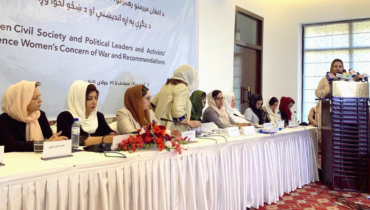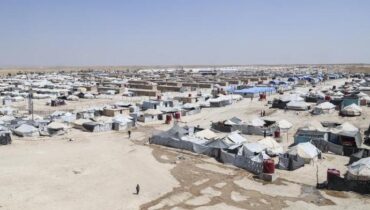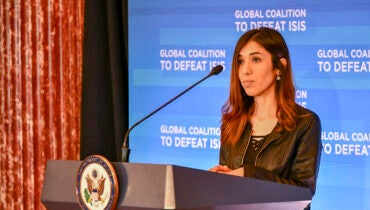By Ambassador Melanne Verveer and Dr. Samina Ahmed
Originally posted in the Boston Globe here.
Women in Pakistan are systematically subjected to discrimination and are increasingly targeted by violent extremists. Fifteen years after the adoption of UN Security Council Resolution 1325, reaffirming the importance of women in the prevention and resolution of conflict and peacebuilding, it is in the conflict zones of northwestern Pakistan and the tribal belt bordering on Afghanistan that women are most vulnerable. But there is much that could be done to involve women in political and social processes in Pakistan that could help counter this unacceptable situation.
Violence against women is endemic across the country amid a climate of impunity and state inaction. Women have borne the brunt of the steady rise in religious extremism and jihadi militancy, the byproducts of military-devised strategies to legitimize past dictatorships and military-dictated national security and counterinsurgency policies that continue to appease too many armed extremists at home. Eight years into Pakistan’s democratic transition, some legislation now offers fragile steps to protect and empower women, much of it authored by brave women legislators. But Parliament has yet to repeal discriminatory legislation, particularly the Hudood Ordinances that fuel gender inequity and injustice. While social attitudes toward women remain biased, unresponsive state institutions, including a dysfunctional and gender-insensitive criminal justice system, put their lives at grave risk.
The extent to which women’s rights violations go unpunished is particularly alarming in the conflict zones of Khyber Pakhtunkhwa province and the Federally Administered Tribal Areas, as detailed in a new report from the Crisis Group titled “Women, Violence and Conflict in Pakistan.” Militants target women activists, political leaders, and development workers without consequence. Women are as badly hit by heavy-handed military operations that have disrupted the peace, displaced communities and destroyed homes and livelihoods.
Across FATA, the rule of law is tenuous by design, governed by the draconian 1901 Frontier Crimes Regulations; in Khyber Pakhtunkhwa’s Provincially Administered Tribal Areas, rights are undermined by sharia law under the Nizam-e-Adl Regulations 2009. Discriminatory informal justice systems have entrenched the impunity with which men abuse or murder women. Jirgas, all-male councils of elders, treat women as commodities, giving away females, often minors, to settle a feud or sanctioning the killing of a woman to preserve her male relatives’ honor. The state’s increased reliance on informal armed militias (lashkars) to counter militancy has also led to countless abuses against women, including killings, sexual violence, abductions and forced marriages.
Women, living in or fleeing conflict, are forced to fend for themselves as fathers, husbands or sons are killed in combat, join the militants or “disappear” — kidnapped for ransom or held in military-run detention centers. Forced to depend on extended families, women’s health and other needs are neglected, and they are increasingly vulnerable to abuse, including sexual violence.
Accounts of miscarriages and deliveries while fleeing conflict zones, of stress impacting lactation, and of trafficking of displaced women abound. Gender-insensitive relief assistance adds to their woes. In areas of displacement, female health and relief workers are few. Aid distribution points — and even toilets — in camps are often in public spaces most women find difficult to access or are prevented from accessing by religious leaders claiming to protect their “honor.” The military and civil bureaucracies restrict local and international NGO access to IDP-hosting areas, though they could fill the gaps in the state’s inadequate assistance for displaced females.
Standing up for women’s rights can mean risking one’s life. Najma Hanif Jadoon, a rights activist, who contested the 2013 polls, was shot dead in Peshawar. Yet, women and women’s rights activists are determined, despite barriers and threats, to continue their struggle for political, social and economic empowerment. In 2013, Badam Zari was the first woman candidate from the tribal belt to stand for elections. Braving militant threats and the opposition of local strong men, women turned out to vote in unprecedented numbers in Federally Administered Tribal Areas’ Khyber agency.
Multiplying the numbers of women decision-makers, voters, and public officials will be central to sustainable reform. Pakistan should invest in their empowerment, repeal the laws that permit institutionalized violence and discrimination, and counter extremist threats. Only by involving women in designing counterinsurgency and peacebuilding policies that directly affect their security will Pakistan succeed in curbing violent religious extremism and fostering peace and stability.


